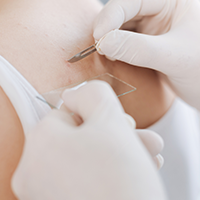What's a Dermatologist?
Dermatologists are specialist medical doctors who are experts in conditions of the skin, hair, nails, wet areas of mouth and genitalia and skin cancer.
Dermatologists care for people of all ages, from newborns to seniors. They can diagnose, treat and manage more than 3,000 skin conditions.
They help people with conditions such as psoriasis, eczema, vitiligo, acne, alopecia, skin infections and skin cancer.
Dermatologists can treat skin conditions in a number of ways, including medical, surgical, procedural and cosmetic techniques. Some dermatologists also conduct Mohs surgery, which is a special technique used to remove skin cancers.
What does a dermatologist do?
Skin, hair and nail conditions can be complex. A dermatologist will work with you to find a diagnosis and to develop a management plan for your ongoing treatment.
A dermatologist will look at your physical symptoms and might take tests to reach a diagnosis. Your symptoms might also be affecting your wellbeing such as your ability to sleep, work and your mental health. It is important that you talk to your dermatologist about how your condition is affecting you.
Your treatment plan may include medicines you take (oral medications), treatments you put on your skin (topical medications), surgery or procedures like laser or light therapy, or avoiding things that may be causing an allergic reaction.
As specialists, dermatologists also provide second opinions and advice to other doctors.
What treatments can a dermatologist provide?
Dermatologists provide a range of medical, surgical, procedural and cosmetic treatments including
- Medicines, like creams and gels that you put on your skin – these are known as topical medicines
- Medicines, like pills, capsules or liquids that you take by mouth – these are known as oral medicines
- Surgery, such as skin cancer excisions and repairs (grafts and flaps)
- Procedures like laser vein procedures, phototherapy and biopsies
- Practical advice about diet, skin care routines, dressings, and other ways you can help manage your condition.
Your dermatologist will explain:
- Why they recommend this treatment
- How it works
- What the potential side effects are
- Potential risks of the treatment
- How much it costs.
It is up to you whether you agree to have the treatment.
They may also put you in touch with patient support groups and other organisations that can provide practical information, advice and emotional support.
What education and training does a dermatologist have?
Dermatologists must undertake many years of education and training. They first do a medical degree at university, then they spend at least 2 years doing medical training in a hospital as a junior doctor.
Then, to become a dermatologist they do at least 4 years of specialist dermatology training under the supervision of the Australasian College of Dermatologists (ACD), working alongside experienced doctors to complete thousands of hours treating patients, and passing final exams.
Some dermatologists have completed part of their training overseas. They usually complete further training to practice locally.
All dermatologists in Australia are registered as specialists with the Medical Board of Australia.
Some dermatologists undertake advanced training to perform Mohs surgery to treat skin cancers. Find more information about Mohs specialists and Mohs surgery for skin cancer.
What does FACD mean?
FACD stands for Fellow of the Australasian College of Dermatologists (ACD).
A Fellow is a specialist doctor who:
- Has successfully completed the ACD dermatology training program and passed the Fellowship exams or
- Has trained overseas and meets the standards required by the ACD.
All Fellows are members of the College and must participate in ongoing professional development.
The ACD is the only medical college in Australia that is accredited by the Australian Medical Council to deliver the training and continuing professional development of doctors in the specialty of dermatology.
You can expect the highest level of care and expertise from doctors who hold FACD.
Where do dermatologists work?
Most Australian dermatologists work in metropolitan private practice. Many also hold positions in public or private hospitals or day procedure centres, where they see patients in outpatient clinics.
Many dermatologists are involved in the training of dermatology registrars in public and private hospitals. Many are also involved in clinical and academic research or are involved in clinical trials.
Many provide outreach and telehealth services to regional, rural and remote areas of Australia on a regular basis.
Remember
- Dermatologists are specialist medical doctors who are the experts in skin health.
- It is important to talk to your dermatologist about your physical symptoms and how your condition is affecting you.
- Use the Find a dermatologist directory to search for a dermatologist by location and area of expertise.
